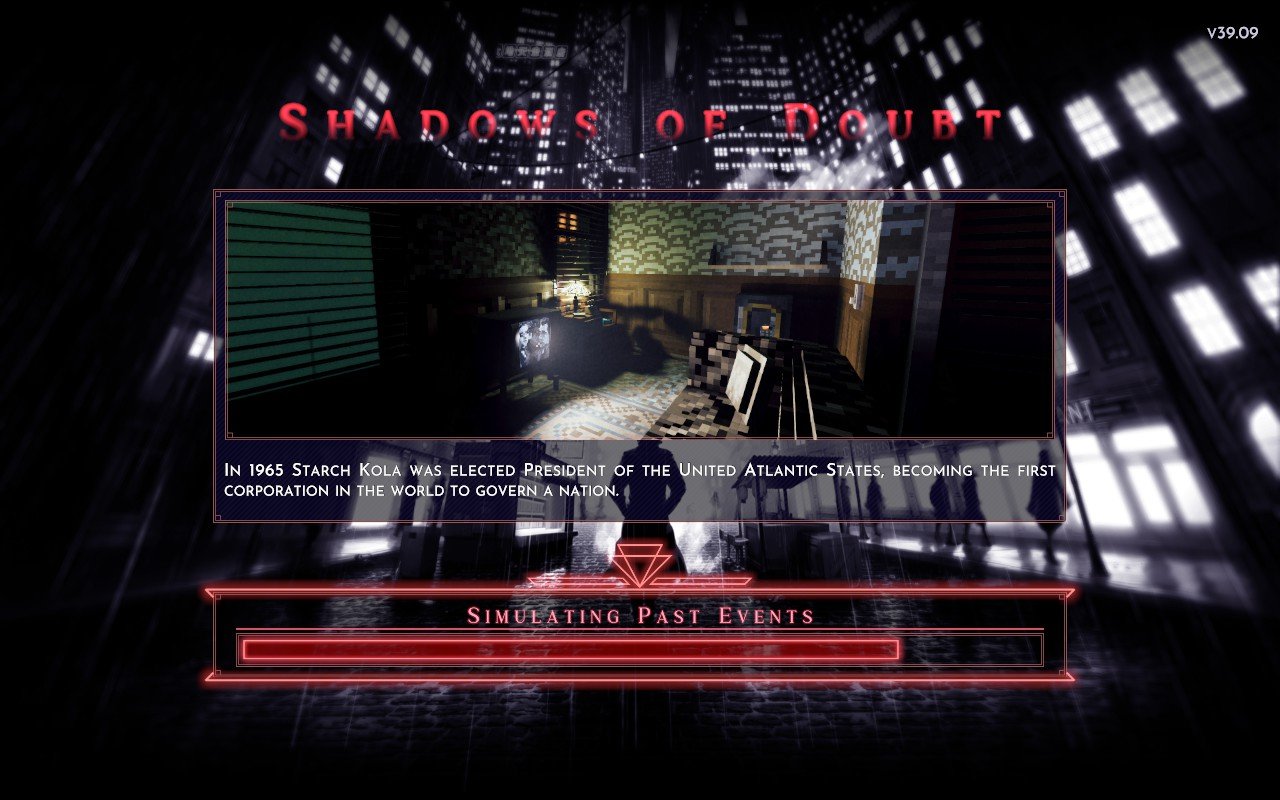Review | Shadows Of Doubt - There's No Doubt That This Is A Pretty Rough Stakeout
Shadows of Doubt is a first-person detective game where you solve crimes in a series of procedurally generated cities. It was developed by ColePowered Games and published by Fireshine. First released in Early Access in 2023, it hit its 1.0 launch on September 26th of this year and has come out to a series of lukewarm reviews in spite of having over 10,000 ratings on Steam that rank it in the “very positive” category.
One digression here before getting into the nitty-gritty. Since 1.0, the game’s review scores have plummeted to a rating of “mixed.” When digging into what the narrative is on Steam, many players are saying the same thing: the game needed more time to bake. Apparently, those who were excited about Shadows of Doubt’s progress in Early Access are shocked that its publisher chose to officially launch the 1.0 version in its current state. The unfinished feeling implicit in the negativity of these reviews showed through clearly in my time with the game.
There’s a sandbox element to Shadows of Doubt. That means the city you’re exploring to solve whatever crime has taken place will always be different. The game has a set number of pre-generated cities but is more than happy to create more places for you to explore through procedural generation, allowing marketing folks to pitch the game with straplines like: “No two mysteries will be the same.” Unfortunately, the result of a small developer with a limited budget runway attempting to pull off such an aspirational concept has led to Shadows of Doubt creating the opposite effect in my head; all of its mysteries feel the same.
I’m not a huge fan of voxel art in first-person to begin with, but I wanted to give this game’s rendition a chance. That said, after loading into my fifth city and seeing the same blocky street corners and NPCs bustling robotically through laundromats, I felt ready to move on and try something else. The combination of a jerky first-person camera angle and perplexing UI choices make interacting with the world and its objects – what you would think might be the core of any sandbox detective game – feel bad. What’s more, the city generation itself takes a long while, especially if you’re loading in on a Steam Deck or similar handheld PC.
I could probably deal with all this and still give Shadows of Doubt a tepid recommendation, though, if it weren’t for the sameness of its NPCs and clues. The clues you collect to solve each case are very similar across runs, and talking to people feels like a chore. Bribery is the main game mechanic for getting new information out of people no matter their station, and when you piss someone off enough for them to chase you down, they present very little threat since your sprint speed is designed to be far faster than theirs. On top of that, your detective never gets tired, so these moments of would-be tension end up feeling woefully frictionless.
Most times you’re given the exact same list of questions to ask during conversation irrespective of context, and NPCs act very similarly in spite of how you treat them or what kind of situation you’re in. As you might imagine, the same question options beget very similar answers, so much so that uncovering new evidence feels more like retreading familiar ground in slightly different environments.
Speaking of the game’s environments, it’s cool that Shadows of Doubt sets out to generate a theoretically endless number of sandbox cities, but these locations don’t actually end up feeling that way at all. Rather, each one is just a slightly tweaked series of blocks with the same stuff inside them over and over. This makes solving a case feel more like a relief and less like a deductive triumph – you’re just throwing familiar spaghetti at a familiar wall and seeing which bits stick this time.
I would like to highlight another rather depressing element of Shadows of Doubt’s setting. It concerns an implicit cultural insensitivity drawn on heavily in cyberpunk fiction since the genre was conceived. As brought up in Liv Ngan’s review on Eurogamer, the game seems to happily crib the aesthetics of Asian countries’ cityscapes without much thought for the implications of its own fictional world. I think she says it best as someone who has been tracking the trend in games and media for a while now.
The UAS [Shadow of Doubt’s setting] is a "loose" group of Western Europe and North American countries, firmly placing us within the western part of the world. But every generated city has the same Asian iconography perpetuated in cyberpunk. Neon lights. Random jumbles of Japanese, Chinese, and Korean writing put together on signs. Paper lanterns line some streets, while others randomly have Chinatown arches placed there. As I walk around the different cities the game has generated, all I can think is: Why? Why do these all exist here? Why is there nothing stereotypically French or Italian lining the streets?
While I haven't been able to stomach this long enough to find out about the origin of Starch Kola in-game, or even if its origin is explained, one loading screen tells you about a technology corporation called Kaizen-6, which was founded by someone called Kyra Cho. Kaizen-6, with its Japanese name, founded by someone with a common Korean surname. The more you look, the more you see it. The conflation of East Asian countries into one "entity" as a representative of American techno-orientalism is nothing new within cyberpunk or video games, but I'm sorely tired of it.
This insensitivity within Shadow of Doubt’s setting – the veneer of mismatched Eastern aesthetics and vibes that has become the game’s marketing USP and how it stands out from the crowd on Steam – is the injury to which its gameplay failings add an unfortunate amount of insult.
All this said, though, I have Shadows of Doubt to thank for showing me what kinds of detective games I do enjoy. I used to think I was a fan of all games in the genre and now know that’s not the case. Developing a player’s trust in the world is what makes deductive leaps feel satisfying, and good detective games need to have control over their experiences enough for players to feel comfortable investing their time in unravelling the mysteries found within. Lucas Pope’s Return of the Obra Dinn comes to mind as a shining example of what I’m talking about here.
In fact, thinking about Obra Dinn and the games it has inspired since its release in 2018 leads me to the conclusion that procedural generation is actually antithetical to making a quality mystery game. The most satisfying part of reading a thrilling novel or watching a detective track down a killer on TV is the distinct element of curation put into serving you these experiences. The clues play out just so. The fiction supports all kinds of plausible theories before landing on the one that makes the most sense after copious amounts of measured deduction. Such curation helps creators develop trust in the eyes of their audiences, even when using the simplest graphical tools to depict the worlds they seek to bring to life. Color Gray’s The Case of the Golden Idol is evidence of this fact.
I would recommend playing those games first to get your detective fix if you haven't already. And if you’re done with both games and all of The Golden Idol’s DLC, then you’d be better off having a look somewhere else. Shadows of Doubt is too lost in its own procedurally generated sauce to provide a rewarding experience for gamers excited about its many lofty promises.
Pros:
Novel concept
Had potential in Early Access
Cons:
Cultural insensitivity
Same-y environments, NPCs, and clues
Jumbled UI










